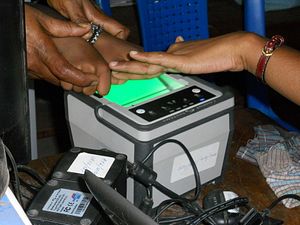When India’s Aadhar card project began, with the goal of issuing a universal identity card for all citizens, it appeared to be an ambitious scheme that was at best very sensible and useful and, at worst, harmless. It was yet another government database, but contained biometric data on top of mere paper information. The scheme was rolled out and people signed up at different points. Above all, it was voluntary. Over time however, while many began to see the benefits of an Aadhar card, its pervasiveness grew in a non-voluntary manner.
In the early months of 2017 — and in March in particular — the Indian government has meted out several missives regarding the Aadhar, gradually increasing the range of activities for which it is compulsory. As large numbers of Indian citizens still have not received their cards and rolling deadlines for its application are ongoing, these directives have not been clearly implemented yet. However, the government’s plans highlight the ways in which the lack of an Aadhar card may pose challenges for Indian citizens.
Since late February 2017, the government has sent at least 14 notifications regarding public services that now require the Aadhar. Applications for Personal Account Number (PAN) Card are to soon require the provision of an Aadhar Card. LPG subsidies, some food subsidies, Employee Provident Funds (EPFs), some passport services, railway concessions and payments, mobile phone number verification, and possibly even attendance tracking for government employees and driving license application are all to be routed through Aadhar. The possibility of tying more welfare schemes to the Aadhar has faced significant criticism in the country; critics note the fate of similar initiatives in states like Andhra Pradesh, where the implementation of universal identity card requirements had not been smooth.
In the wake of all this, the Supreme Court of India has clearly spoken out against making welfare benefits contingent on the mandatory use of Aadhar. An earlier verdict also indicated that making Aadhar a voluntary option for welfare schemes was permissible, but to make it compulsory would disadvantage individuals. However, it has also said that it cannot stop the government from a mandatory linking of Aadhar to non-welfare activities like banking or filing tax returns.
The state’s rationale for the ever-pervasive use of the Aadhar has consistently been to grow a database that minimizes duplicity and fraud. However, this has raised concerns as well since the Aadhar database is of a size and scale that few others in India have come close to matching. Linking this database to other areas, like banking, taxation, or education records allows the government to compare, correlate, and track the transactions of individuals like never before.
The possibility of linked tax returns has caused consternation particularly among expats in India as well as Indians living abroad, both of whom hitherto did not see any real need for Aadhar enrollment. While provisions are in the pipeline that will allow both these groups to apply for the card ahead of the strict implementation of the government’s envisaged policies, other groups are less lucky. Extremely vulnerable groups like children, disabled citizens, illiterate individuals, women rescued from trafficking, etc., now all need to join the Aadhar database in keeping with several policy notifications. With an ever-growing scope and enrollment base, the security of the database becomes all the more of a concern.
The looming question of privacy is naturally brought up within all of the above. To what extent does a pervasive Aadhar regime allow the government to gain access to information on its citizens? Can there be any robust mechanisms that allow citizens to seek redressal in the case of a privacy breach in the database? And finally, how justified is the government in tacitly coercing individuals to part with new levels of privacy in return for state recognition through this universal identity card?

































